Unit 1 Can you play the guitar Section A2 (Grammar Focus-3c)同步优学案(含答案)
文档属性
| 名称 | Unit 1 Can you play the guitar Section A2 (Grammar Focus-3c)同步优学案(含答案) | 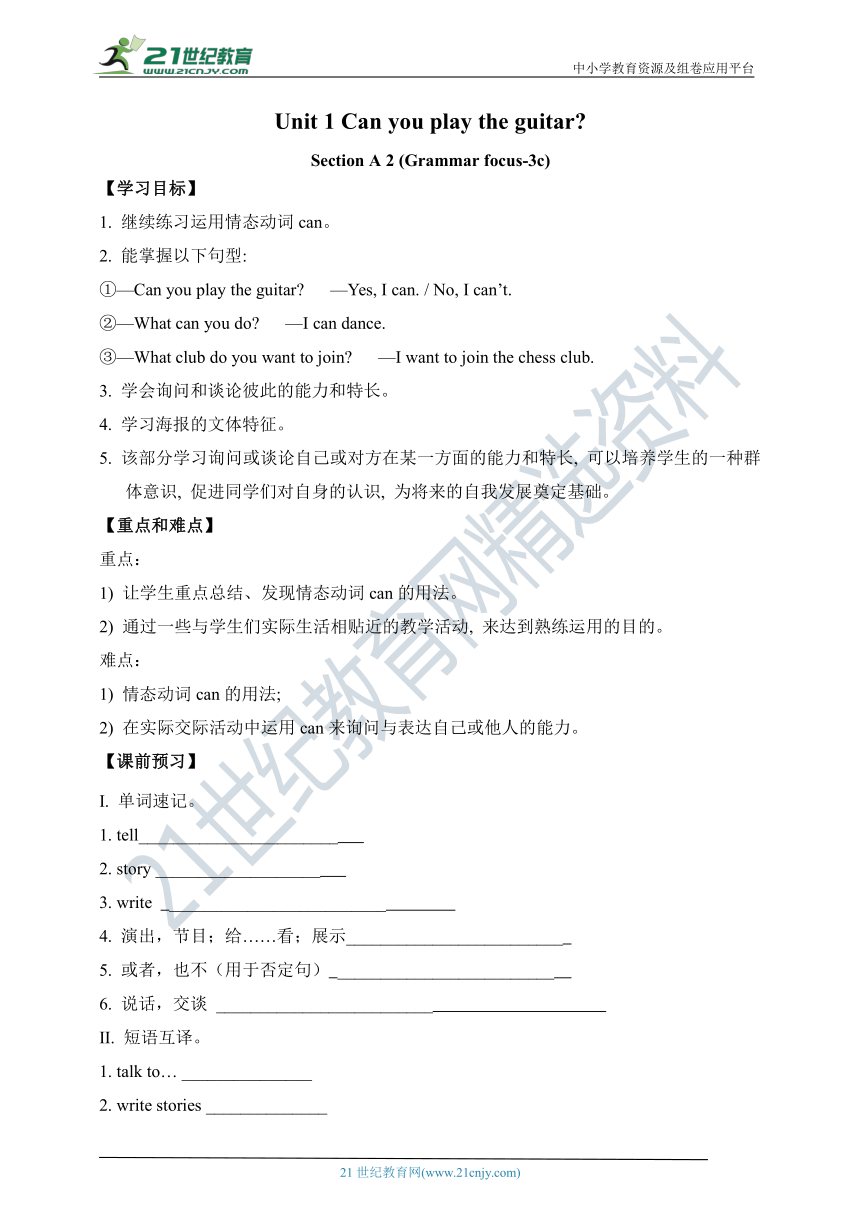 | |
| 格式 | doc | ||
| 文件大小 | 1.3MB | ||
| 资源类型 | 试卷 | ||
| 版本资源 | 人教新目标(Go for it)版 | ||
| 科目 | 英语 | ||
| 更新时间 | 2021-02-19 14:41:03 | ||
图片预览

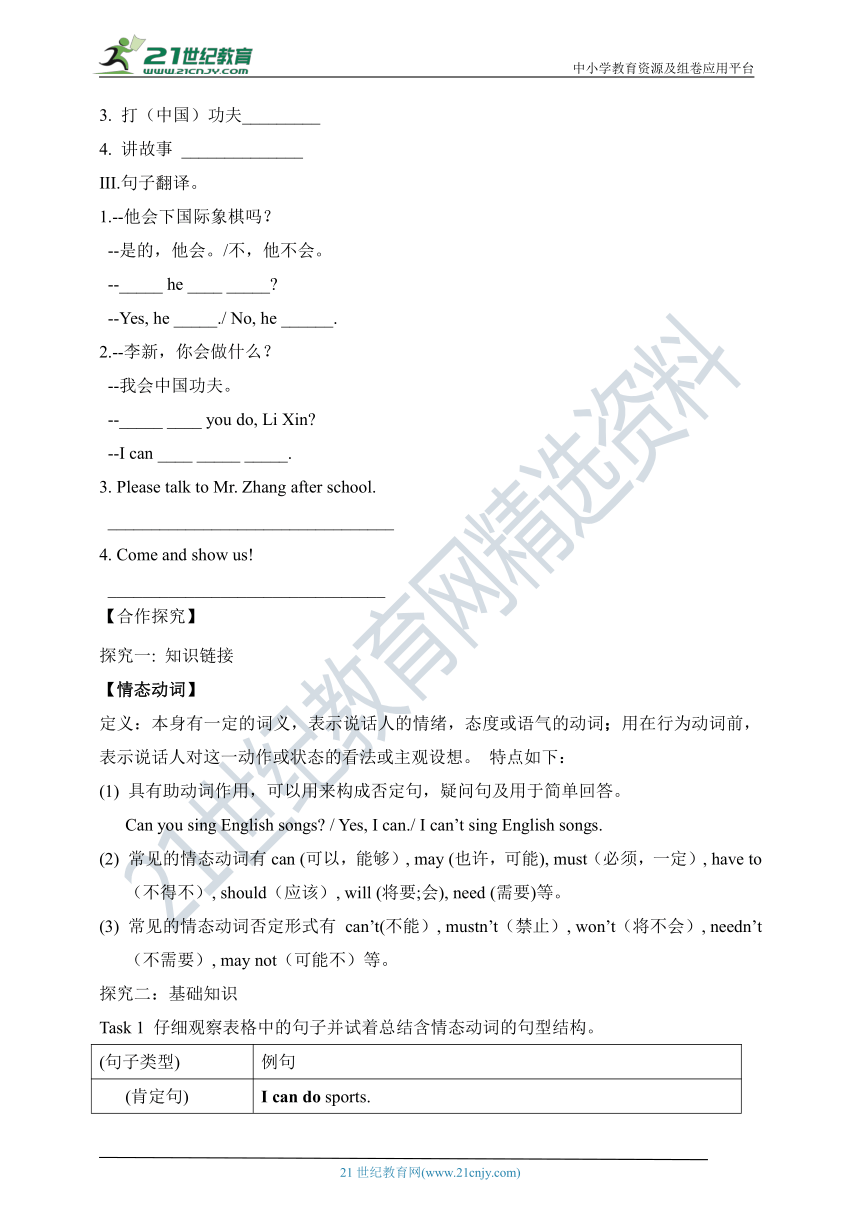
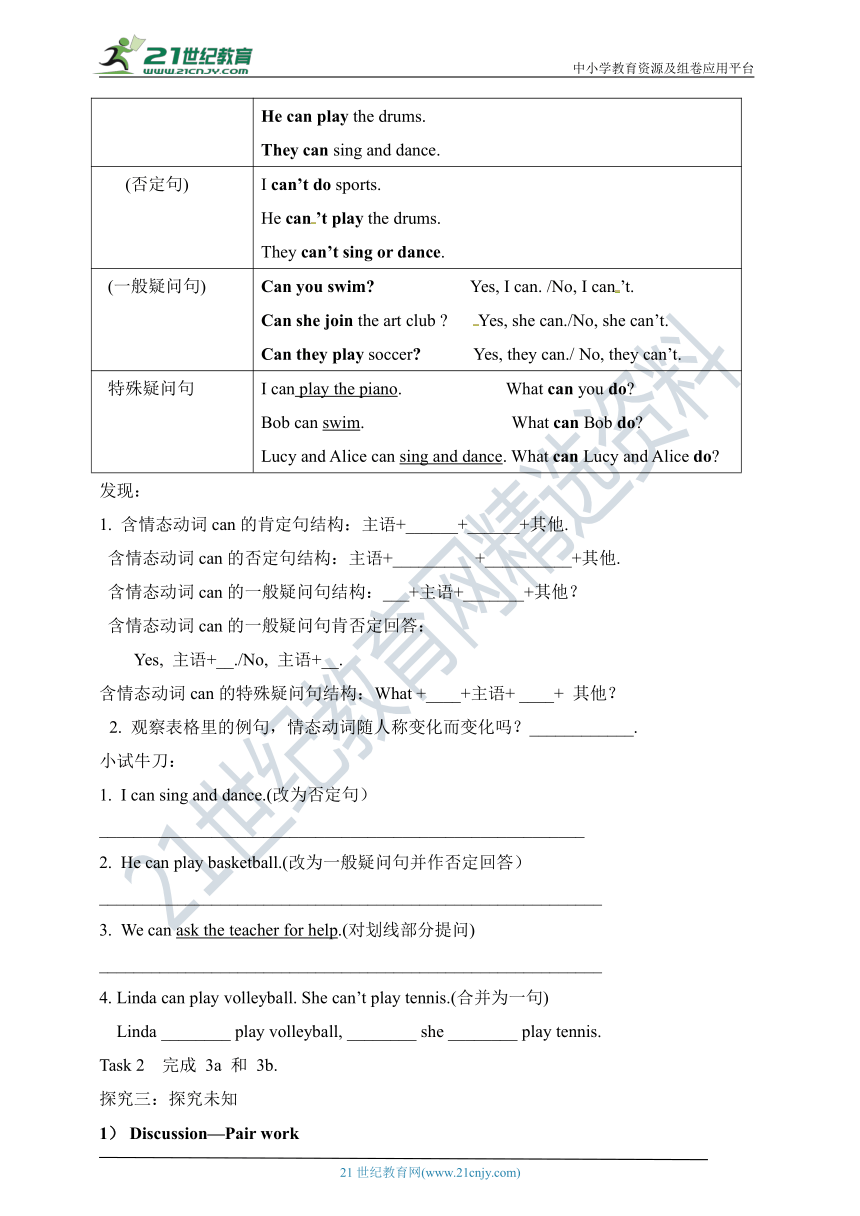
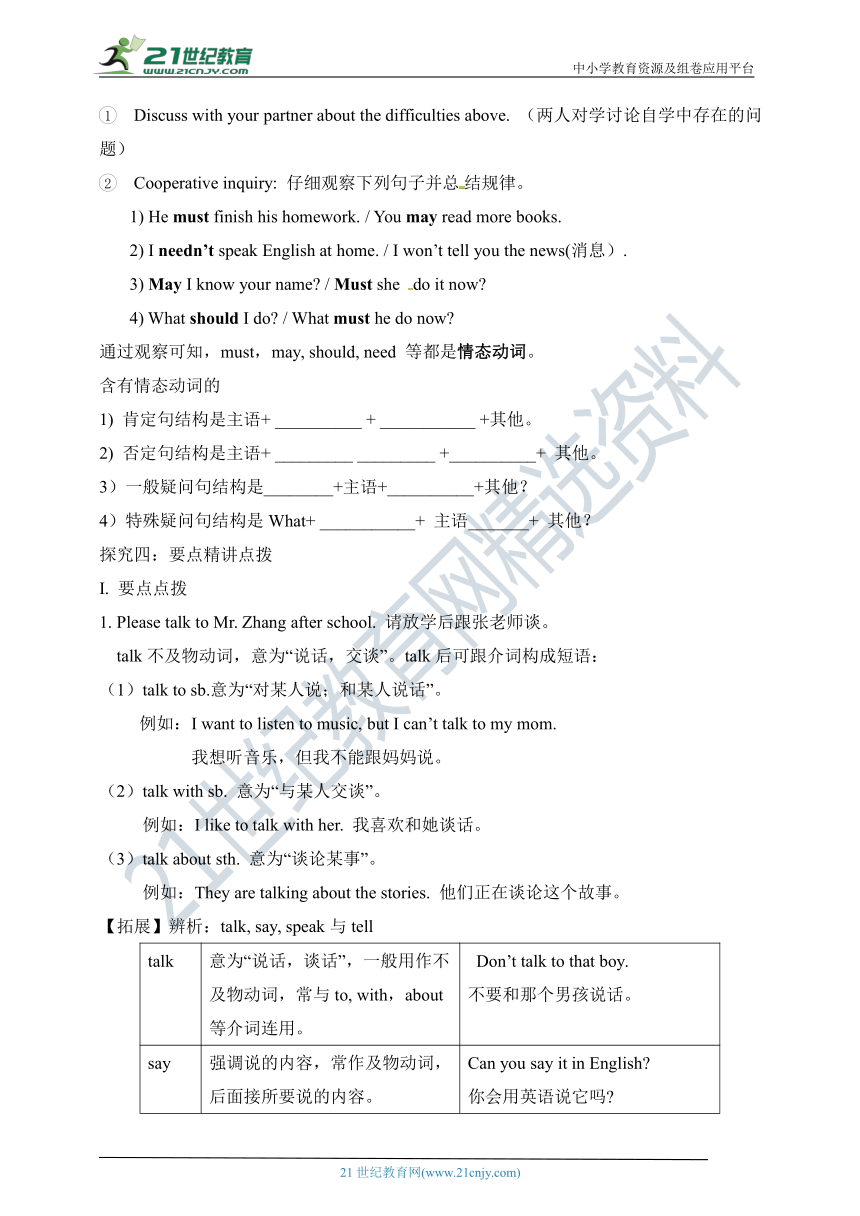
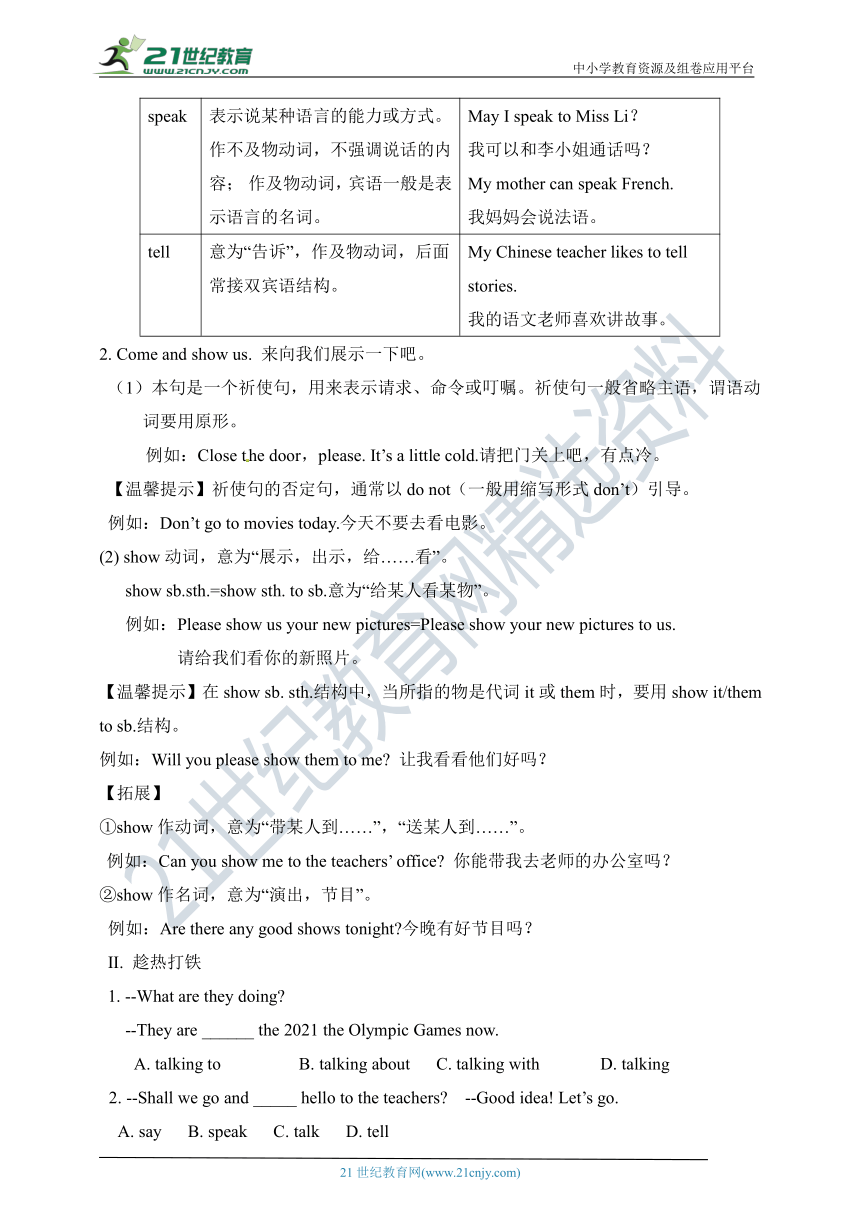
文档简介
中小学教育资源及组卷应用平台
Unit 1 Can you play the guitar?
Section A 2 (Grammar focus-3c)
【学习目标】
1. 继续练习运用情态动词can。
2. 能掌握以下句型:
①—Can you play the guitar? —Yes, I can. / No, I can’t.
②—What can you do? —I can dance.
③—What club do you want to join? —I want to join the chess club.
3. 学会询问和谈论彼此的能力和特长。
4. 学习海报的文体特征。
5. 该部分学习询问或谈论自己或对方在某一方面的能力和特长, 可以培养学生的一种群体意识, 促进同学们对自身的认识, 为将来的自我发展奠定基础。
【重点和难点】
重点:
1) 让学生重点总结、发现情态动词can的用法。
2) 通过一些与学生们实际生活相贴近的教学活动, 来达到熟练运用的目的。
难点:
1) 情态动词can的用法;
2) 在实际交际活动中运用can来询问与表达自己或他人的能力。
【课前预习】
I. 单词速记。
1. tell_______________________
2. story ___________________
3. write _________________________
4. 演出,节目;给……看;展示_________________________
5. 或者,也不(用于否定句) _________________________
6. 说话,交谈 _________________________
II. 短语互译。
1. talk to… _______________
2. write stories ______________
3. 打(中国)功夫_________
4. 讲故事 ______________
III.句子翻译。
1.--他会下国际象棋吗?
--是的,他会。/不,他不会。
--_____ he ____ _____?
--Yes, he _____./ No, he ______.
2.--李新,你会做什么?
--我会中国功夫。
--_____ ____ you do, Li Xin?
--I can ____ _____ _____.
3. Please talk to Mr. Zhang after school.
_________________________________
4. Come and show us!
________________________________
【合作探究】
探究一: 知识链接
【情态动词】
定义:本身有一定的词义,表示说话人的情绪,态度或语气的动词;用在行为动词前,表示说话人对这一动作或状态的看法或主观设想。 特点如下:
(1) 具有助动词作用,可以用来构成否定句,疑问句及用于简单回答。
Can you sing English songs? / Yes, I can./ I can’t sing English songs.
(2) 常见的情态动词有can (可以,能够), may (也许,可能), must(必须,一定), have to(不得不), should(应该), will (将要;会), need (需要)等。
(3) 常见的情态动词否定形式有 can’t(不能), mustn’t(禁止), won’t(将不会), needn’t(不需要), may not(可能不)等。
探究二:基础知识
Task 1 仔细观察表格中的句子并试着总结含情态动词的句型结构。
(句子类型) 例句
(肯定句) I can do sports.
He can play the drums.
They can sing and dance.
(否定句) I can’t do sports.
He can’t play the drums.
They can’t sing or dance.
(一般疑问句) Can you swim? Yes, I can. /No, I can’t.
Can she join the art club ? Yes, she can./No, she can’t.
Can they play soccer? Yes, they can./ No, they can’t.
特殊疑问句 I can play the piano. What can you do?
Bob can swim. What can Bob do?
Lucy and Alice can sing and dance. What can Lucy and Alice do?
发现:
1. 含情态动词can的肯定句结构:主语+______+______+其他.
含情态动词can的否定句结构:主语+_________ +__________+其他.
含情态动词can的一般疑问句结构:___+主语+_______+其他?
含情态动词can的一般疑问句肯否定回答:
Yes, 主语+__./No, 主语+__.
含情态动词can的特殊疑问句结构:What +____+主语+ ____+ 其他?
观察表格里的例句,情态动词随人称变化而变化吗?____________.
小试牛刀:
I can sing and dance.(改为否定句)
________________________________________________________
He can play basketball.(改为一般疑问句并作否定回答)
__________________________________________________________
We can ask the teacher for help.(对划线部分提问)
__________________________________________________________
4. Linda can play volleyball. She can’t play tennis.(合并为一句)
Linda ________ play volleyball, ________ she ________ play tennis.
Task 2 完成 3a 和 3b.
探究三:探究未知
Discussion—Pair work
Discuss with your partner about the difficulties above. (两人对学讨论自学中存在的问题)
Cooperative inquiry: 仔细观察下列句子并总结规律。
1) He must finish his homework. / You may read more books.
2) I needn’t speak English at home. / I won’t tell you the news(消息).
3) May I know your name? / Must she do it now?
4) What should I do? / What must he do now?
通过观察可知,must,may, should, need 等都是情态动词。
含有情态动词的
1) 肯定句结构是主语+ __________ + ___________ +其他。
2) 否定句结构是主语+ _________ _________ +__________+ 其他。
3)一般疑问句结构是________+主语+__________+其他?
4)特殊疑问句结构是What+ ___________+ 主语_______+ 其他?
探究四:要点精讲点拨
I. 要点点拨
1. Please talk to Mr. Zhang after school. 请放学后跟张老师谈。
talk不及物动词,意为“说话,交谈”。talk后可跟介词构成短语:
(1)talk to sb.意为“对某人说;和某人说话”。
例如:I want to listen to music, but I can’t talk to my mom.
我想听音乐,但我不能跟妈妈说。
(2)talk with sb. 意为“与某人交谈”。
例如:I like to talk with her. 我喜欢和她谈话。
(3)talk about sth. 意为“谈论某事”。
例如:They are talking about the stories. 他们正在谈论这个故事。
【拓展】辨析:talk, say, speak与tell
talk 意为“说话,谈话”,一般用作不及物动词,常与to, with,about等介词连用。 Don’t talk to that boy.
不要和那个男孩说话。
say 强调说的内容,常作及物动词,后面接所要说的内容。 Can you say it in English?
你会用英语说它吗?
speak 表示说某种语言的能力或方式。作不及物动词,不强调说话的内容; 作及物动词,宾语一般是表示语言的名词。 May I speak to Miss Li?
我可以和李小姐通话吗?
My mother can speak French.
我妈妈会说法语。
tell 意为“告诉”,作及物动词,后面常接双宾语结构。 My Chinese teacher likes to tell stories.
我的语文老师喜欢讲故事。
2. Come and show us. 来向我们展示一下吧。
(1)本句是一个祈使句,用来表示请求、命令或叮嘱。祈使句一般省略主语,谓语动词要用原形。
例如:Close the door,please. It’s a little cold.请把门关上吧,有点冷。
【温馨提示】祈使句的否定句,通常以do not(一般用缩写形式don’t)引导。
例如:Don’t go to movies today.今天不要去看电影。
(2) show动词,意为“展示,出示,给……看”。
show sb.sth.=show sth. to sb.意为“给某人看某物”。
例如:Please show us your new pictures=Please show your new pictures to us.
请给我们看你的新照片。
【温馨提示】在show sb. sth.结构中,当所指的物是代词it或them时,要用show it/them to sb.结构。
例如:Will you please show them to me? 让我看看他们好吗?
【拓展】
①show作动词,意为“带某人到……”,“送某人到……”。
例如:Can you show me to the teachers’ office? 你能带我去老师的办公室吗?
②show作名词,意为“演出,节目”。
例如:Are there any good shows tonight?今晚有好节目吗?
II. 趁热打铁
1. --What are they doing?
--They are ______ the 2021 the Olympic Games now.
A. talking to B. talking about C. talking with D. talking
2. --Shall we go and _____ hello to the teachers? --Good idea! Let’s go.
A. say B. speak C. talk D. tell
3. _____ up, Anna. It’s seven thirty.
A. Get B. Gets C. Getting D. Got
【课时小结】
重点单词
write(v.)写作;写字
show(n.)演出;节目
(v.)给……看;展示
or(conj.)或者;也不(用于否定句)
talk(v.&n.)说话;交谈
kung fu(n.)(中国)功夫
重点词组
talk to…跟……说
重点句式
1. —Can he play chess?他会下棋吗?
—Yes,he can./No, he can’t. 是的,他会。/不,他不会。
2. We want students for the school show.
我们需要学生参加学校的表演。
【达标检测】
Ⅰ. 单词拼写。
1.Mike likes singing, so he (想)to be a singer.
2.Tom is good at sports, he will (加入)NBA when he grows up(长大).
3.Sam is from America, he is good at (讲)English.
4.His grandpa likes reading story books, he often (讲)stories to the kids.
5.Kelly swims fast, she is a member of the swimming (俱乐部).
6.The girl likes listening to (story), she will be in story telling club.
7.We will have a (sport)meeting next week.
8.In the art club, you can make (friend)with different students.
9.Mr. Black is a teacher from England, he (teach)us English history.
10.Susan likes reading very much, she is sure she will be a (write)someday.
II. 根据汉语意思完成句子。
1. 请给我们看一下你的新吉他吧!
Please your new guitar us.
2. 我们想为学校的表演招聘学生。
We want students the .
3. Lucy想和她的朋友谈话。
Lucy wants to her friend.
4. 李欣会表演中国功夫。
Li Xin kung fu.
III.短文填空。用适当的单词填空
John and Peter study in the same class. They are good 1 . Both of them like 2 very much. From Monday to Friday, they often 3 to play football on the playground after school. On 4 , their parents often take them to the city football club. Mr. Smith is their football 5 . They can learn a lot from him. They practice football 6 two hour. Although they sometimes feel 7 , they play very well now. There is a football 8 between their school and No.3 Middle School. Both John and Peter 9 to win the game. So they talk 10 their classmates and make a good plan for the game. They believe that they can win the game.
1. 2. 3. 4. 5. 6. 7. 8. 9. 10.
【自我评价】
1. 本课我学会了什么?
___________________________________________________________
2. 通过本课的学习,我还有哪些疑问?
___________________________________________________________
参考答案:
【课前预习】
I. 单词速记
1. 讲述,告诉 2. 故事,小说 3. 写作,写字 4. show 5. or 6. talk
II. 短语互译。
1. 跟……说 2. 写故事 3. do kung fu 4. tell stories
III. 1. Can; play chess; can; can’t 2.What can; do kung fu 3. 请放学后跟张老师谈。
4. 来展示给我们看吧!
【合作探究】
探究二
发现:1. can+动词原形; can’t +动词原形; Can;动词原形; can; can’t; can; 动词原形.
2. 不变化。
小试牛刀:
1. I can’t sing or dance.
2. Can he play basketball? Yes, he can/ No, he can’t.
3. What can we do?
4. can; but; can’t.
探究三
1. 情态动词+动词原形
2. 情态动词+not+动词原形
3. 情态动词;动词原形
4. 情态动词;动词原形
II. 趁热打铁
1—3 BAA
【达标检测】
Ⅰ. 单词拼写。
1. wants 2. join 3. speaking 4. tells 5. club 6. stories 7. sports 8. friends 9. teaches 10. writer
Ⅱ. 根据汉语意思完成句子
1. show, to 2. for, school show 3. talk to 4. can do
III. 短文填空。
1.friends 2.football 3.go 4.weekends 5.teacher 6. for 7.Tired 8.game 9.hope 10.with
_21?????????è?????(www.21cnjy.com)_
Unit 1 Can you play the guitar?
Section A 2 (Grammar focus-3c)
【学习目标】
1. 继续练习运用情态动词can。
2. 能掌握以下句型:
①—Can you play the guitar? —Yes, I can. / No, I can’t.
②—What can you do? —I can dance.
③—What club do you want to join? —I want to join the chess club.
3. 学会询问和谈论彼此的能力和特长。
4. 学习海报的文体特征。
5. 该部分学习询问或谈论自己或对方在某一方面的能力和特长, 可以培养学生的一种群体意识, 促进同学们对自身的认识, 为将来的自我发展奠定基础。
【重点和难点】
重点:
1) 让学生重点总结、发现情态动词can的用法。
2) 通过一些与学生们实际生活相贴近的教学活动, 来达到熟练运用的目的。
难点:
1) 情态动词can的用法;
2) 在实际交际活动中运用can来询问与表达自己或他人的能力。
【课前预习】
I. 单词速记。
1. tell_______________________
2. story ___________________
3. write _________________________
4. 演出,节目;给……看;展示_________________________
5. 或者,也不(用于否定句) _________________________
6. 说话,交谈 _________________________
II. 短语互译。
1. talk to… _______________
2. write stories ______________
3. 打(中国)功夫_________
4. 讲故事 ______________
III.句子翻译。
1.--他会下国际象棋吗?
--是的,他会。/不,他不会。
--_____ he ____ _____?
--Yes, he _____./ No, he ______.
2.--李新,你会做什么?
--我会中国功夫。
--_____ ____ you do, Li Xin?
--I can ____ _____ _____.
3. Please talk to Mr. Zhang after school.
_________________________________
4. Come and show us!
________________________________
【合作探究】
探究一: 知识链接
【情态动词】
定义:本身有一定的词义,表示说话人的情绪,态度或语气的动词;用在行为动词前,表示说话人对这一动作或状态的看法或主观设想。 特点如下:
(1) 具有助动词作用,可以用来构成否定句,疑问句及用于简单回答。
Can you sing English songs? / Yes, I can./ I can’t sing English songs.
(2) 常见的情态动词有can (可以,能够), may (也许,可能), must(必须,一定), have to(不得不), should(应该), will (将要;会), need (需要)等。
(3) 常见的情态动词否定形式有 can’t(不能), mustn’t(禁止), won’t(将不会), needn’t(不需要), may not(可能不)等。
探究二:基础知识
Task 1 仔细观察表格中的句子并试着总结含情态动词的句型结构。
(句子类型) 例句
(肯定句) I can do sports.
He can play the drums.
They can sing and dance.
(否定句) I can’t do sports.
He can’t play the drums.
They can’t sing or dance.
(一般疑问句) Can you swim? Yes, I can. /No, I can’t.
Can she join the art club ? Yes, she can./No, she can’t.
Can they play soccer? Yes, they can./ No, they can’t.
特殊疑问句 I can play the piano. What can you do?
Bob can swim. What can Bob do?
Lucy and Alice can sing and dance. What can Lucy and Alice do?
发现:
1. 含情态动词can的肯定句结构:主语+______+______+其他.
含情态动词can的否定句结构:主语+_________ +__________+其他.
含情态动词can的一般疑问句结构:___+主语+_______+其他?
含情态动词can的一般疑问句肯否定回答:
Yes, 主语+__./No, 主语+__.
含情态动词can的特殊疑问句结构:What +____+主语+ ____+ 其他?
观察表格里的例句,情态动词随人称变化而变化吗?____________.
小试牛刀:
I can sing and dance.(改为否定句)
________________________________________________________
He can play basketball.(改为一般疑问句并作否定回答)
__________________________________________________________
We can ask the teacher for help.(对划线部分提问)
__________________________________________________________
4. Linda can play volleyball. She can’t play tennis.(合并为一句)
Linda ________ play volleyball, ________ she ________ play tennis.
Task 2 完成 3a 和 3b.
探究三:探究未知
Discussion—Pair work
Discuss with your partner about the difficulties above. (两人对学讨论自学中存在的问题)
Cooperative inquiry: 仔细观察下列句子并总结规律。
1) He must finish his homework. / You may read more books.
2) I needn’t speak English at home. / I won’t tell you the news(消息).
3) May I know your name? / Must she do it now?
4) What should I do? / What must he do now?
通过观察可知,must,may, should, need 等都是情态动词。
含有情态动词的
1) 肯定句结构是主语+ __________ + ___________ +其他。
2) 否定句结构是主语+ _________ _________ +__________+ 其他。
3)一般疑问句结构是________+主语+__________+其他?
4)特殊疑问句结构是What+ ___________+ 主语_______+ 其他?
探究四:要点精讲点拨
I. 要点点拨
1. Please talk to Mr. Zhang after school. 请放学后跟张老师谈。
talk不及物动词,意为“说话,交谈”。talk后可跟介词构成短语:
(1)talk to sb.意为“对某人说;和某人说话”。
例如:I want to listen to music, but I can’t talk to my mom.
我想听音乐,但我不能跟妈妈说。
(2)talk with sb. 意为“与某人交谈”。
例如:I like to talk with her. 我喜欢和她谈话。
(3)talk about sth. 意为“谈论某事”。
例如:They are talking about the stories. 他们正在谈论这个故事。
【拓展】辨析:talk, say, speak与tell
talk 意为“说话,谈话”,一般用作不及物动词,常与to, with,about等介词连用。 Don’t talk to that boy.
不要和那个男孩说话。
say 强调说的内容,常作及物动词,后面接所要说的内容。 Can you say it in English?
你会用英语说它吗?
speak 表示说某种语言的能力或方式。作不及物动词,不强调说话的内容; 作及物动词,宾语一般是表示语言的名词。 May I speak to Miss Li?
我可以和李小姐通话吗?
My mother can speak French.
我妈妈会说法语。
tell 意为“告诉”,作及物动词,后面常接双宾语结构。 My Chinese teacher likes to tell stories.
我的语文老师喜欢讲故事。
2. Come and show us. 来向我们展示一下吧。
(1)本句是一个祈使句,用来表示请求、命令或叮嘱。祈使句一般省略主语,谓语动词要用原形。
例如:Close the door,please. It’s a little cold.请把门关上吧,有点冷。
【温馨提示】祈使句的否定句,通常以do not(一般用缩写形式don’t)引导。
例如:Don’t go to movies today.今天不要去看电影。
(2) show动词,意为“展示,出示,给……看”。
show sb.sth.=show sth. to sb.意为“给某人看某物”。
例如:Please show us your new pictures=Please show your new pictures to us.
请给我们看你的新照片。
【温馨提示】在show sb. sth.结构中,当所指的物是代词it或them时,要用show it/them to sb.结构。
例如:Will you please show them to me? 让我看看他们好吗?
【拓展】
①show作动词,意为“带某人到……”,“送某人到……”。
例如:Can you show me to the teachers’ office? 你能带我去老师的办公室吗?
②show作名词,意为“演出,节目”。
例如:Are there any good shows tonight?今晚有好节目吗?
II. 趁热打铁
1. --What are they doing?
--They are ______ the 2021 the Olympic Games now.
A. talking to B. talking about C. talking with D. talking
2. --Shall we go and _____ hello to the teachers? --Good idea! Let’s go.
A. say B. speak C. talk D. tell
3. _____ up, Anna. It’s seven thirty.
A. Get B. Gets C. Getting D. Got
【课时小结】
重点单词
write(v.)写作;写字
show(n.)演出;节目
(v.)给……看;展示
or(conj.)或者;也不(用于否定句)
talk(v.&n.)说话;交谈
kung fu(n.)(中国)功夫
重点词组
talk to…跟……说
重点句式
1. —Can he play chess?他会下棋吗?
—Yes,he can./No, he can’t. 是的,他会。/不,他不会。
2. We want students for the school show.
我们需要学生参加学校的表演。
【达标检测】
Ⅰ. 单词拼写。
1.Mike likes singing, so he (想)to be a singer.
2.Tom is good at sports, he will (加入)NBA when he grows up(长大).
3.Sam is from America, he is good at (讲)English.
4.His grandpa likes reading story books, he often (讲)stories to the kids.
5.Kelly swims fast, she is a member of the swimming (俱乐部).
6.The girl likes listening to (story), she will be in story telling club.
7.We will have a (sport)meeting next week.
8.In the art club, you can make (friend)with different students.
9.Mr. Black is a teacher from England, he (teach)us English history.
10.Susan likes reading very much, she is sure she will be a (write)someday.
II. 根据汉语意思完成句子。
1. 请给我们看一下你的新吉他吧!
Please your new guitar us.
2. 我们想为学校的表演招聘学生。
We want students the .
3. Lucy想和她的朋友谈话。
Lucy wants to her friend.
4. 李欣会表演中国功夫。
Li Xin kung fu.
III.短文填空。用适当的单词填空
John and Peter study in the same class. They are good 1 . Both of them like 2 very much. From Monday to Friday, they often 3 to play football on the playground after school. On 4 , their parents often take them to the city football club. Mr. Smith is their football 5 . They can learn a lot from him. They practice football 6 two hour. Although they sometimes feel 7 , they play very well now. There is a football 8 between their school and No.3 Middle School. Both John and Peter 9 to win the game. So they talk 10 their classmates and make a good plan for the game. They believe that they can win the game.
1. 2. 3. 4. 5. 6. 7. 8. 9. 10.
【自我评价】
1. 本课我学会了什么?
___________________________________________________________
2. 通过本课的学习,我还有哪些疑问?
___________________________________________________________
参考答案:
【课前预习】
I. 单词速记
1. 讲述,告诉 2. 故事,小说 3. 写作,写字 4. show 5. or 6. talk
II. 短语互译。
1. 跟……说 2. 写故事 3. do kung fu 4. tell stories
III. 1. Can; play chess; can; can’t 2.What can; do kung fu 3. 请放学后跟张老师谈。
4. 来展示给我们看吧!
【合作探究】
探究二
发现:1. can+动词原形; can’t +动词原形; Can;动词原形; can; can’t; can; 动词原形.
2. 不变化。
小试牛刀:
1. I can’t sing or dance.
2. Can he play basketball? Yes, he can/ No, he can’t.
3. What can we do?
4. can; but; can’t.
探究三
1. 情态动词+动词原形
2. 情态动词+not+动词原形
3. 情态动词;动词原形
4. 情态动词;动词原形
II. 趁热打铁
1—3 BAA
【达标检测】
Ⅰ. 单词拼写。
1. wants 2. join 3. speaking 4. tells 5. club 6. stories 7. sports 8. friends 9. teaches 10. writer
Ⅱ. 根据汉语意思完成句子
1. show, to 2. for, school show 3. talk to 4. can do
III. 短文填空。
1.friends 2.football 3.go 4.weekends 5.teacher 6. for 7.Tired 8.game 9.hope 10.with
_21?????????è?????(www.21cnjy.com)_
同课章节目录
- Unit 1 Can you play the guitar?
- Section A
- Section B
- Unit 2 What time do you go to school?
- Section A
- Section B
- Unit 3 How do you get to school?
- Section A
- Section B
- Unit 4 Don't eat in class.
- Section A
- Section B
- Unit 5 Why do you like pandas?
- Section A
- Section B
- Unit 6 I'm watching TV.
- Section A
- Section B
- Review of Units 1-6
- Unit 7 It's raining!
- Section A
- Section B
- Unit 8 Is there a post office near here?
- Section A
- Section B
- Unit 9 What does he look like?
- Section A
- Section B
- Unit 10 I'd like some noodles.
- Section A
- Section B
- Unit 11 How was your school trip?
- Section A
- Section B
- Unit 12 What did you do last weekend?
- Section A
- Section B
